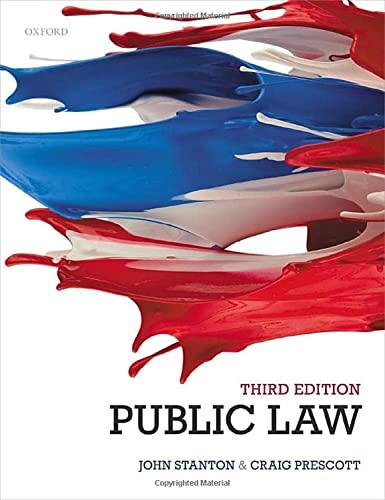Question
PART A MULTIPLE CHOICE QUESTIONS (10 MARKS) 1. The following is not an example of an abuse of process: (a) The pursuit of proceedings that
PART A MULTIPLE CHOICE QUESTIONS (10 MARKS)
1. The following is not an example of an abuse of process: (a) The pursuit of proceedings that have no prospect of success. (b) The pursuit of proceedings requiring particulars. (c) The pursuit of proceedings involving re-litigation of matters already determined. (d) The pursuit of proceedings for collateral purposes.
2. Bulldogs Rugby League Club Ltd v Williams [2008] NSWSC 822 is a case about: (a) Special actions and substituted service. (b) Special parties and service out of the jurisdiction. (c) Substituted service and service out of the jurisdiction.
(d) Special actions and service out of the jurisdiction.
3. Which of the following is not true regarding costs orders against legal practitioners? (a) In making such an order, the Court will use its discretion judicially and cautiously. (b) Costs orders against legal practitioners can be levied on an indemnity basis. (c) Costs orders against practitioners are provided for by s 97 of the Civil Procedure Act 2005 (NSW).
(d) Costs orders can be made against legal practitioners who act in a case without reasonable prospects of success.
4. In Samsung Electronics Co Limited v Apple Inc [2011] FCAFC 156; 217 FCR 238; 286 ALR, the Full Federal Court of Australia articulated: (a) The calculation of costs in a Bullock Order. (b) Bases upon which it might hear an appeal from an interlocutory order.
(c) The calculation of costs in a Sanderson Order. (d) Two bases upon which costs might be ordered on an indemnity basis.
5. The case of Leach v The Nominal Defendant [2014] NSWCA 391 revolved around: (a) Calderbank offers. (b) Mareva orders. (c) Anton Piller orders.
(d) Offers of compromise under the UCPR.
6. Which of the following actions would be commenced by way of a summons? (a) Proceedings for the appointment of a tutor.
(b) Proceedings for the damages for breach of contract. (c) Proceedings for the possession of land. (d) Proceedings relief in relation to a tort.
7. Which of the following is not a basis for striking out pleading? (a) Where the pleading discloses no reasonable cause of action. (b) Where the pleading is an abuse of the process of the court. (c) Where the pleading pleads material facts, not evidence.
(d) Where the pleading has a tendency to cause embarrassment, delay or prejudice.
8. Where proceedings are referred to mediation under s 26 of the Civil Procedure Act 2005 (NSW), parties are: (a) Not required to participate if they do not consent. (b) Required to come to a settlement.
(c) Bound by the rules of evidence. (d) Required to participate in good faith.
9. Writs of execution can best be described as: (a) Tools to enforce judgments. (b) Tools to ensure proper pleading. (c) Tools to speed up interlocutory applications. (d) Tools to gather evidence.
10. Which of the following is not true of affidavits: (a) The pages of an affidavit must be numbered consecutively. (b) The paragraphs of an affidavit must be numbered consecutively. (c) The person who makes an affidavit is known as the deponent. (d) The jurat is placed as a heading to the affidavit. PART B EXTENDED WRITTEN RESPONSE (10 MARKS)
'The case management system has fundamentally improved access to justice to NSW courts.'
Discuss this statement by reference to the Civil Procedure Act 2005 (NSW) and Uniform Civil Procedure Rules 2005 (NSW) and other relevant legislation. Through your discussion, identify key legal and ethical issues arising from this statement.
PART C
Question 1 (4 marks) Save the Forests, an environmental group, is seeking an ex parte interlocutory injunction in the Supreme Court of NSW against Log'Em, a forestry company planning on felling a stand of old-growth forest. Save the Forests argues that the decision to allow Log'Em to cut the forest down did not abide by legislative rules. Moreover, it argues that the destruction of the ecosystem will represent a huge loss in biodiversity and cannot be reversed. What two requirements must Save the Forests fulfil to obtain the injunction? What procedural steps must it take for the Court to grant the injunction? Does it have an obligation of candour? Reference the relevant legal rules or principles for your answer.
Question 2 (4 marks) Hario is currently involved in proceedings against Bethany in the Supreme Court of NSW. Bethany has not filed her defence, has not been attending directions hearings and is not responding to Hario's solicitor's correspondence. Hario has been advised by his solicitor that he is able to apply for a default judgment. In what circumstances can he apply for a default judgment? If he is successful in his application, can Bethany attempt to overturn the judgment? What documents will he need? Reference the relevant legal rules or principles for your answer.
Question 3 (4 marks) Sharon has sought legal advice on how she can recover $8,000 owed to her by her work colleague and close friend Ying. Both women reside in New South Wales. Explain one option available to Sharon to recover the money prior to commencing legal proceedings. If this preliminary option is not successful, in which Court would Sharon commence her proceedings and why? What documents would Sharon use to commence the proceedings? What are the steps she must complete in order to commence the proceedings? Reference the relevant legal rules or principles for your answer.
Step by Step Solution
There are 3 Steps involved in it
Step: 1

Get Instant Access to Expert-Tailored Solutions
See step-by-step solutions with expert insights and AI powered tools for academic success
Step: 2

Step: 3

Ace Your Homework with AI
Get the answers you need in no time with our AI-driven, step-by-step assistance
Get Started


